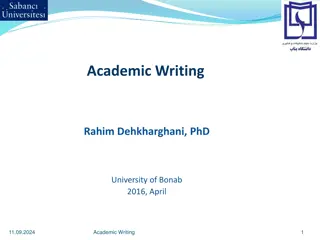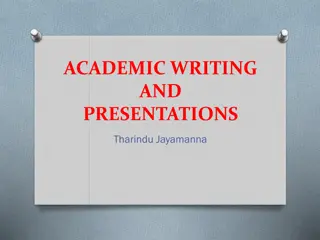Importance of Writing Abstracts in Academic Papers
An abstract serves as a concise summary of a paper, encapsulating its key points such as the significance of the issue, main argument, methodology, results, and implications. It should be self-contained and clearly convey the essence of the research without assuming prior knowledge from the reader. Abstracts play a crucial role in helping readers quickly grasp the paper's content and decide whether to delve deeper into the full text.
Download Presentation

Please find below an Image/Link to download the presentation.
The content on the website is provided AS IS for your information and personal use only. It may not be sold, licensed, or shared on other websites without obtaining consent from the author. Download presentation by click this link. If you encounter any issues during the download, it is possible that the publisher has removed the file from their server.
E N D
Presentation Transcript
+What is an Abstract? An abstract must be a fully self-contained, capsule description of the paper. It can't assume (or attempt to provoke) the reader to look for an explanation of what is meant by some vague statement. It must make sense all by itself.
+Memory Abstract Put your paper aside. In 5-8 sentences write an abstract of your paper. This is basically a summary. It should include: Motivation: Why is the issue/problem important? Problem Statement: What is the main argument of your paper? Methodology: Describe your interpretative angle or the types of evidence used in your research. Mention key concepts, key terms, and make clear which aspects you will focus on. Results: Foreshadow the conclusion of the discussion. What is the point of the paper? Implications: What are the implications of this conclusion? How does this work add to the body of knowledge on the topic?
+Abstract Example The Tony Hawk Learning Project Lauren Silberman and Elisabeth (Betty) Hayes (Mentor), Curriculum & Instruction The study is to show how even a sport video game can incorporate many types of learning, to call attention to what might be overlooked as significant forms of learning, and to understand and take advantage of the opportunities video games afford as more deliberate learning environments. The aspects explored are the skills and techniques required to be successful in the game, the environment that skaters skate in, the personal vs. group identity that is shown through the general appearance of the skater, and the values and icons that the game teaches players. We are finding that sport video games support learning; we hope to find how one learns about oneself as a learner from playing.

 undefined
undefined































